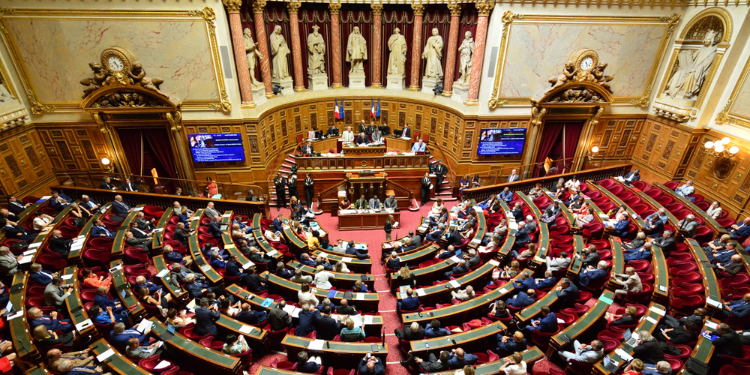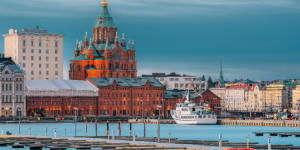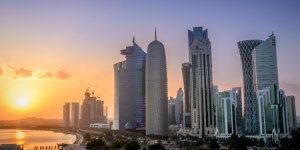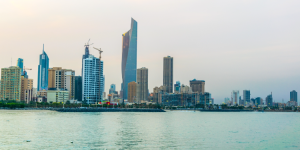
Ministers of Labor and Interior's announcement of a new immigration law has made a buzz in France since November 3. The two French ministers have outlined the new asylum and immigration law, which aims at addressing the labor shortage and facilitating the entry of qualified foreign workers into France. The bill will soon be presented to Parliament and then to the Senate.
Facilitating legal immigration
In the face of a never-ending labor shortage, the French government is looking to introduce a new law to simplify the recruitment of foreigners. To justify the government's decision Minister of Labor Olivier Dussopt explained that "Professional organizations have been urging us to facilitate the hiring of foreigners. With this law, we are providing them with a solution..." To his statement, French minister of Interior Gérald Darmanin added: "Maybe we don't give enough residence permits for workers...".
The new law proposition triggered a strong outcry across the floor, namely from the far right, which strongly advocates a "zero immigration" policy, and on the left, who believes that the government could go further. With this new bill, the French government is looking to meet the expectations of local entrepreneurs and the needs of foreign workers. It seems that these demands have been understood and that, in the end, the recruitment of foreign workers will be facilitated, under specific conditions.
Immigration has always been a controversial issue in France. Consequently, new measures in this regard are often approached with caution when they are not nipped in the bud by sterile identity-based debates that often have no direct connection with reality. According to Olivier Dussopt, "hard" rules must be counterbalanced by initiatives "to facilitate immigration". The Minister also notes that immigrants and foreigners are the most affected by unemployment, recalling, at the same time, a situation described by researchers. For decades, these researchers have been pointing out the discrimination suffered by immigrants in France based on their origins, places of residence and names, even when they have all the required qualifications. Should this be assimilated into an attempt to appease both the right and please the left wings?
What will change with the new immigration law
Olivier Dussopt lists the four main changes that the new law is expected to bring:
- The creation of a dedicated residence permit for foreigners to work in sectors that are officially facing labor shortages.
- The lifting of the current ban on work for asylum seekers during their first 6 months in France under certain conditions (the Minister does not yet specify them).
- The possibility for undocumented workers to apply for regularization themselves. Previously, undocumented workers had to seek assistance from their employers. But often, the latter were tempted to employ workers illegally in order to save money. This change was particularly expected by the workers' unions.
- The halt of OQTF procedures (obligation to leave French territory) for undocumented law-minding migrants who work in sectors under pressure.
Darmanin and Dussopt claim that they want to put an end to an "absurd system".
Specific residence permits for in-demand jobs
Established by decree and published on April 1, 2021, in the Journal Officiel (JO), the latest official list of professions in tension includes about thirty occupations and sectors. This list will be reviewed and discussed with the social partners.
The list of jobs facing labor shortages published in the Official Gazette includes nurses and other paramedical professionals, electrical and electronic draftsmen, surveyors, design and development technicians in information technology, truck drivers, boilermakers, sheet metal workers, tracers, locksmiths, metalworkers, blacksmiths, butchers, engineers and managers in the design, research and development (industry), etc. The list established by the government is subdivided by region. According to a survey conducted by Pôle Emploi, the public agency in charge of employment in France, there are 10 occupations that are particularly under pressure in France. They are nurses, nursing assistants, public transport drivers, home helps and housekeepers, plumbers, heating engineers, chefs, maternal assistants, domestic workers and cleaning staff, truck drivers, hairdressers and beauticians. Pôle Emploi, which collected responses from 420,000 businesses for its study, predicts that in 2022 there will be 3 million projected recruitments and that 57.9% of these will be considered difficult.
According to the French Ministers of Labor and of the Interior, the residence permit for "jobs in demand" will concern "between a few thousand and a few tens of thousands of people". These figures were given to reassure the political right, especially the far right, who have long been opposed to the creation of this title. "This is not a plan for mass regularization," the ministers insist. In France, it always seems difficult to talk about immigration without stirring up passionate debates. The left denounces the government's hypocrisy and speaks of the "exploitation" of foreign workers.
Modifying the OQTF Rule (Obligation to leave France)
The new immigration law provides for the mandatory registration of individuals threatened by expulsion (OQTF) in the "fichier des personnes recherchées", a database that will record the actual departure of foreigners. The move will affect all foreigners, regardless of whether or not they have a criminal record. According to the government, foreigners who had actually left the country were still considered to be staying illegally due to incomplete records. When they wanted to return to France with a valid permit, access was denied to them. But Cimade, an organization that helps oppressed people, indicates that there is already a European list: the Schengen Information System.
Currently, foreigners subject to an OQTF but having children born in France cannot be deported. A situation that is no longer sustainable, according to Darmanin. Under the new law, minors will also be targeted. As a result, a person who has been issued an OQTF but has a child under the age of 13 can still be deported along with the child. From now on, it will be the judge's prerogative to decide whether the child can stay in France or not. The government is also tightening up on foreign offenders by promising tougher sanctions. The new immigration law is intended to be more flexible for foreigners who respect the law (they will see their visas automatically renewed) and more severe towards those who break it. Darmanin says he wants to sort out the "good" from the "bad" ones.
The rules are also getting more challenging for asylum seekers: the rejection of their application will automatically result in an OQTF. They will have 15 days to contest the decision. From now on, recourse to the courts will only be possible in "very difficult cases".
Family reunification and French language test
The new legislation will also address family reunification. In line with the recommendations of the Conseil d'Orientation Economique (COE), the French government is seeking to increase the number of economic immigrants. According to the Ministers responsible for the bill, reunification is more about trailing spouses. The new law should specify possible conditions for its application.
Gérald Darmanin also wants to return to the multi-annual residence permits by making them conditional on passing a French language test. Currently, holders of these permits who do not have the required level of French are invited to take language courses. Therefore, there is no obligation to take these courses or even to have a certain level of spoken French to obtain a multi-annual residence permit. However, according to the Minister, a quarter of foreigners who obtain a residence permit in France have an inadequate level of French. In fact, the lack of proficiency in the national language of a country complicates entry into the labor market. These tests will, therefore, help select qualified workers who can be put to work without delay, both in the labor market and in civilian life.
Foreigners and immigrants in France
French National Institute of Statistics and Economic Studies (INSEE) defines a foreigner as "a person who resides in France and does not have French nationality, either because he or she has another nationality (exclusively) or because he or she has no nationality at all (this is the case for stateless persons)”. In that sense, French nationals are only those who possess French nationality either by birth or by naturalization, even along with another nationality or several ones.
In 2021, while the total population of France was 67.6 million, 5.2 million foreigners were living in the country, representing 7.7% of the population. 4.5% of them did not have French nationality. 800,000 were born in France but still do not have French nationality.
According to the French High Council for Integration, "an immigrant is a person born abroad and living in France". People born French abroad and living in France are therefore not counted. Conversely, some immigrants have become French, while others are still considered foreigners. The line between foreign and immigrant populations in France is particularly blurry. An immigrant may not necessarily be a foreigner, and inversely, a person born in France to foreign parents, especially minors, may not be recognized as a French national.
On the other side, the immigrant status is a definitive one. An individual continues to belong to the immigrant population even if they become French by acquisition. It is the country of birth, not the nationality at birth, that defines the geographic origin of an immigrant in France. In 2021, France will count 7 million immigrants or 10.3% of its population. Of these, 2.5 million, or 36% of the population, are French. These people have acquired French nationality since they arrived in the country through naturalization.
A bill that sparks debate
Debates on this issue are expected to be heated. The opposition is already preparing its amendments to prevent regularizations and the arrival of new expatriates. The extreme right denounces a law that would ignore French job seekers. On the other end, businesses argue that these jobs have not been filled by French people, sometimes for years. Workers' unions point out that many jobs in demand are poorly remunerated, poorly recognized, and health-hazard prone. Like all major industrial powers, France needs foreign workers to keep its economy running and dynamic. But the question is whether it will continue reproducing the same immigration model. Are foreigners simply an adjustment variable for economic growth? Will the country open the doors when they are needed and close them again when the needs have been met? This is the issue that is being raised by the political left wing.
What kind of protection will foreign workers get? While ministers talk about one-year residency permits, some interrogations still remain. What will happen after that? Will the permits be "automatically" renewed for "nice" foreigners, as Gérald Darmanin claims? Will the dignity of foreign workers be respected?
According to Cimade, this new law does not seem to be in the interest of those concerned. The list of occupations in tension does not apply to all foreigners. The association points out that, just as the French choose a particular career path, so do foreigners. It is, therefore, useless to confine them to specific fields, often neglected because of poor wages. Cimade sees a two-faced law, just like the previous waves of regularization, which would only offer a partial and punctual solution without giving the necessary conditions for the development of a real-life project on the territory. It criticizes France for taking advantage of foreign workers instead of working out a long-term project with them that would benefit everyone.
Analysts believe France remains divided between two views of immigration: one that is pragmatic and positive and another that is fueled by fear and the rhetoric of the extreme right.



















